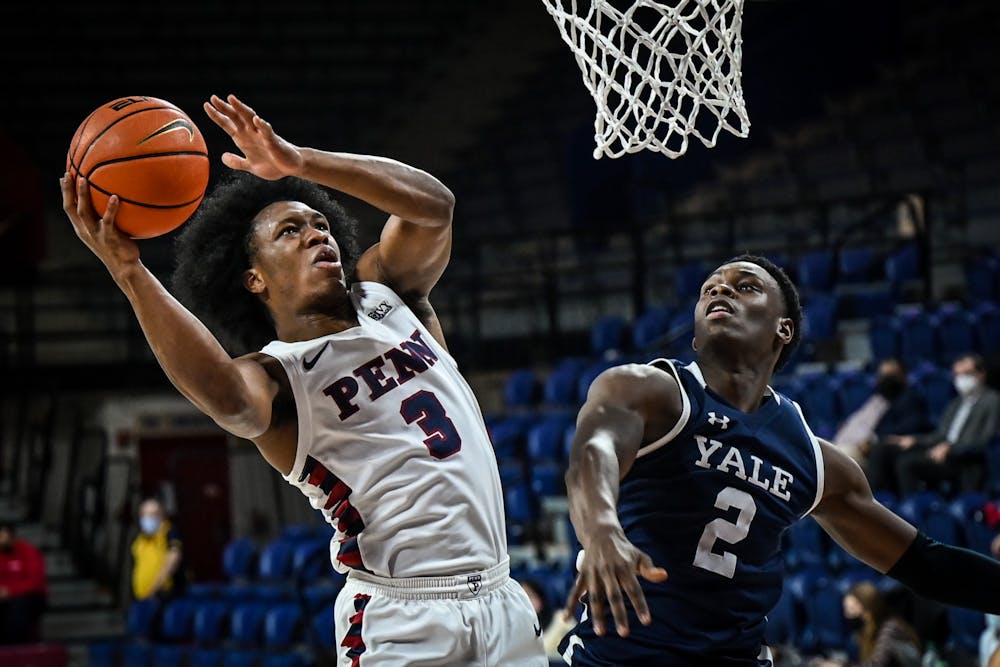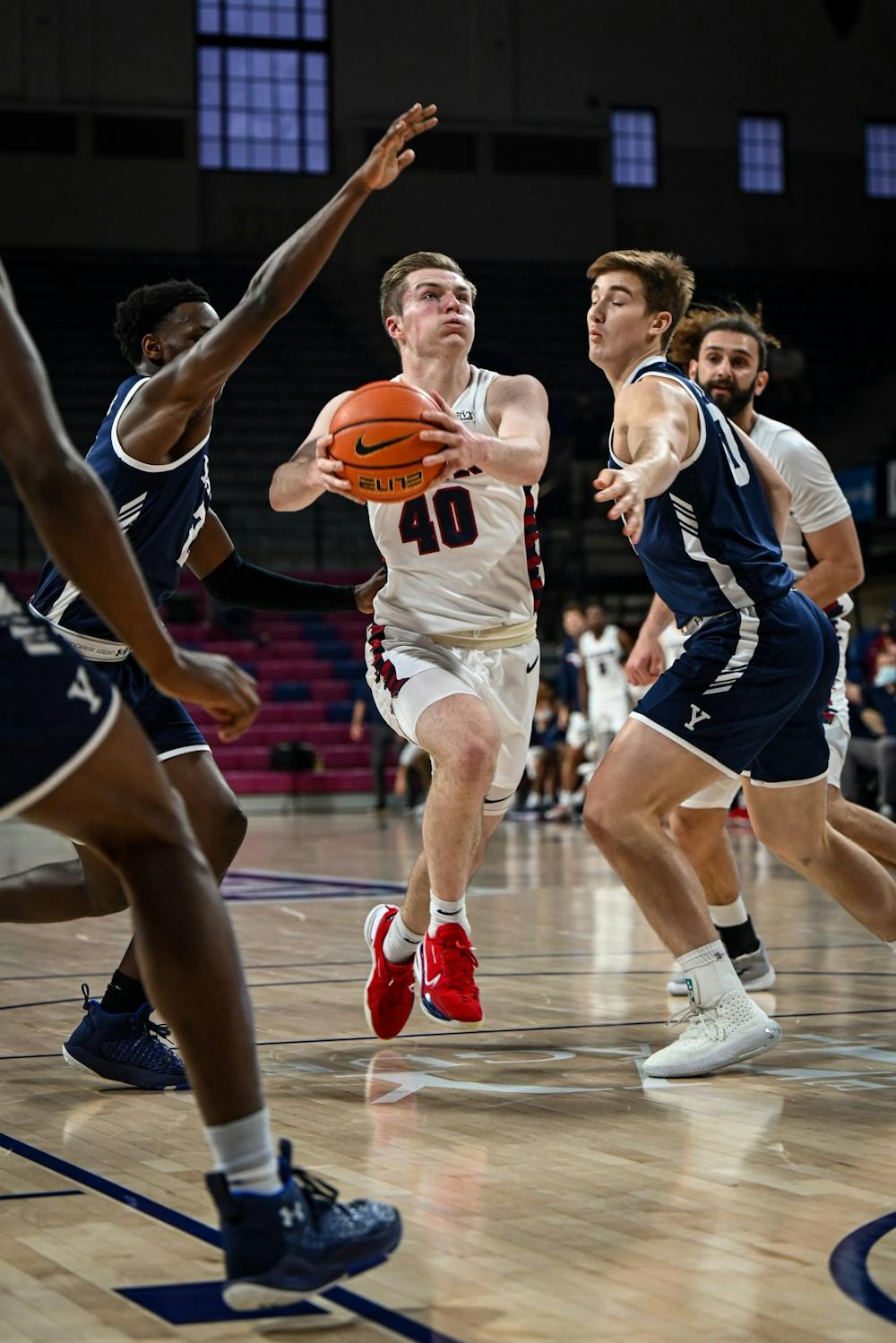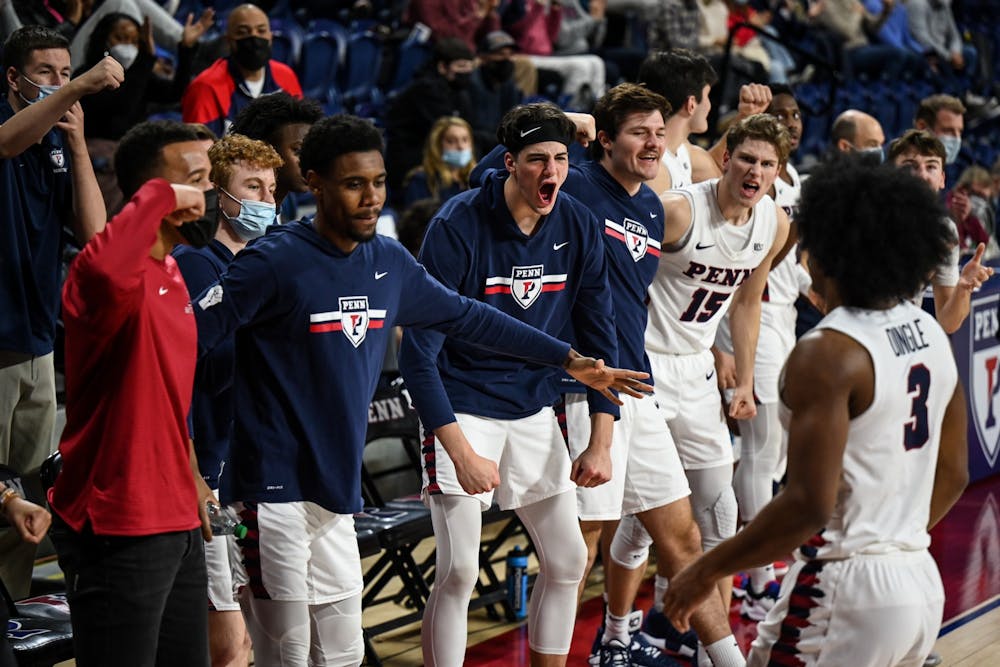
Sophomore guard Jordan Dingle shoots during the second half against Yale at the Palestra on Jan. 22.
Credit: Kylie CooperPenn sophomore guard Jordan Dingle now stands at the top of the Ivy League in points scored, after leading the Quakers to a win against the Yale Bulldogs, 76-68.
In another game with no public spectators in the Palestra stands, the Ivy League’s leading individual scorers at the time of tip-off were finally meeting on the court. Yale’s senior guard Azar Swain arrived atop the Ivy League in points with 19.1 points per game. But immediately at his heels was Dingle, who averaged 17.9 points per game prior to their face-off.
In the end, it was Penn's very own who prevailed. Dingle tied his season high of 31 points, having previously scored 31 against Utah State on Nov 18.
“I think that there was a lot of miscommunications on their end. I don’t think that they had one set way of trying to guard me today,” Dingle said. “And I noticed that there were some big steps on defense that I just tried to take advantage of whenever I saw.”
Dingle wasn't alone in finding opportunities to bring impact on the court. Behind him in scoring was sophomore guard Clark Slajchert with 13 points in 19 minutes, and sophomore forward and guard Max Martz with 11 points in 17 minutes. Junior forward Michael Moshkovitz remained reliable on both sides of the court in his 33 minutes played.
But falling into the rhythm at the start of the game took some time from both ends. Yale took advantage of Penn’s lack of true big men in the starting lineup, making most of its shots from inside the paint.
By four minutes in, the score was still tied 9-9.
Momentum finally shifted to the Quakers when the secondary unit came in.
Slajchert showed off his court vision when he threw a lob to Moshkovitz, who tapped it off the glass to score. The play started off a 7-2 scoring run of fast-paced offense and energy on defense, leading to missed shots and turnovers from the Bulldogs. At the end of the scoring run, the Quakers led 16-11.
While the Bulldogs fought back against Penn's lead, the Quakers remained relentless and dropped another offensive explosion; this time led by Dingle, who proved to be the star of the night.
After charging down to score a floater from the paint, Dingle pushed forward to score another four points, easing through the defense multiple times to extend the lead to 24-16.
Yale entered the bonus and tried to pressure Penn with a full-court zone defense.
Yet the Bulldogs' attempts proved futile. The Quakers scored eight points to finish the first half in several electric plays: a second-chance opportunity by freshman George Smith, an assist from Dingle to junior guard Jonah Charles for a corner three-pointer, and three consecutive foul shots from Smith.

Freshman guard George Smith goes to shoot during the first half of a game against Yale at the Palestra on Jan. 22.
“[Smith] competes in every aspect of the game,” coach Steve Donahue said of the starting freshman. “That’s why you see him out there. He just plays every aspect of the game for a young player.”
The Quakers took a 35-23 lead to end the half, looking to be in a secure position for their second half.
However, in the second half, the Bulldogs came in swinging.
Swain, after a quiet first half with only two points in the opening possession for Yale, immediately scored another five points to narrow the lead to seven. Drawn fouls put the ball back in Swain's hands.
Quakers played catch-up but committed costly turnovers that gifted opportunities to the Bulldogs, allowing Swain to slip into his rhythm.
The Bulldogs went on a 7-2 scoring run within the first three minutes of the half. At 14 minutes left in the game, the Bulldogs had turned a secure 12-point lead by the Quakers to a mere three-point margin at 42-39.
Slajchert tried to push the momentum back to his team, utilizing tight footwork and jab steps to create room to hit a shot over Swain, turning the lead 44-39. Swain immediately answered by scoring a layup in Slajchert’s face to bring the Bulldogs within three.
Yet despite these hiccups, the Quakers protected their lead, taking advantage of Yale's poor scoring behind the three-point line.
At the face of just a point between Penn leading and Yale behind, Dingle claimed center stage. After going cold from the field from a couple of mid-range shots, his drives to the basket grew more confident.
“We need him to be aggressive in the league," coach Steve Donahue said. “Jordan is still the guy we’re going to need to have games like that; to beat really good teams. And if not, I think Jordan’s really good at attracting that attention to get guys easier shots.”

The men's basketball team cheers after sophomore guard Jordan Dingle scores during a game against Yale at the Palestra on Jan. 22.
Into the final five minutes, it was clear that the second half belonged to Dingle, who scored 18 points after halftime. But another late-game contributor was Martz, who worked to score and keep Swain in Penn's palm.
The final stretch of the second half saw a strong team contribution. The Quakers were swift on their feet to break Yale’s press, which coach Steve Donahue said “was a big part of us closing out the game.”
Both teams found space to catch their breath as the game closed with free-throw opportunities. And with Penn’s strong percentage from the free-throw line, the Quakers sealed the win.
“We really shot fouls,” Donahue said. “Over the last couple of years that’s kind of been our Achilles' heel. But we have really good foul shooters and going 17 for 20 is a big reason why we won as well.”
With a boost from this win to take second in the Ivy League, the Quakers continue their season on Jan. 28 against Harvard (10-6, 2-2) in Cambridge, steadfast on their campaign towards the top of the league.
The Daily Pennsylvanian is an independent, student-run newspaper. Please consider making a donation to support the coverage that shapes the University. Your generosity ensures a future of strong journalism at Penn.
Donate






